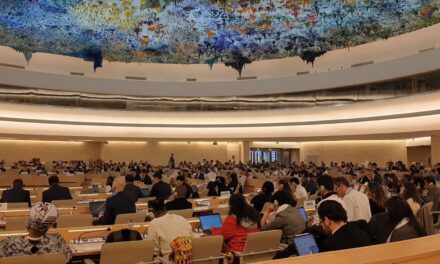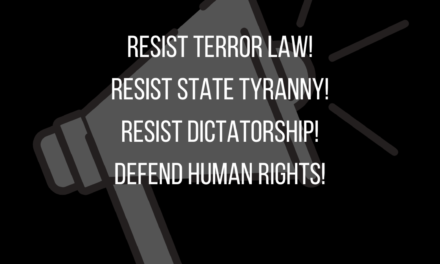By Walden Bello*
This is an excerpt from the Chancellor’s Distinguished Fellow speech, University of California at Irvine, June 8, 2004. The full text is available at http://www.focusweb.org/main/html/Article319.html
“The crisis of the empire is not only good for the world. It is good for the people of the United States as well…”
STRATEGY OF DESPERATION
Despite the fact that the situation in Iraq has spun out of its control, the Bush administration hangs on, pushing through a so-called “transfer of sovereignty” to people associated with the US-controlled “Interim Governing Council” that enjoyed little popular legitimacy.
To whom will “sovereignty” be handed over? What exactly will sovereignty consist of? Where will the legitimacy of the government come from? What exactly is the relationship of the coming government to the United Nations? The United States reserves the right to control its military forces in Iraq and to maintain them there indefinitely. A qualification from Secretary of State Powell that the US would leave if the incoming government asked it to is disingenuous since that regime would never ask for the elimination of the military might on which its own existence depended. These are unresolved issues that lend substance to the New York Times’ charge that “the only unifying these for Washington’s policies seems to be desperation.” The United Nations Security Council recent endorsement of the post-June 30 arrangements will not make this US-imposed solution any more acceptable to the Iraqi people or to the world.
THE LOYAL OPPOSITION
But neither does the Times and the liberal opposition to Bush have any answers. The Times itself, while attacking Bush for inept management of the occupation, endorsed giving the United Nations “real… authority over transition political arrangements,” bringing in more foreign contingents to participate in providing security, and increasing the number of US troops in Iraq in the short run.” But all the elements were already in the Bush plan, including drawing additional troops from the US forces in South Korea.
In so far as the Democrats can be said to have an approach, it approximates the Times’ quibbling, with John Kerry, the Democrats’ presidential candidate, making the key issue not substantive differences with the Bush plan but management of the process: he would manage the Iraq intervention better than Bush. In what was touted as the defining speech of his policy on national security on May 27, 2004, Kerry said NATO should be asked to provide troops, the training of Iraq’s security forces should be “internationalized,” and an “International High Commissioner” be appointed to organize elections, draft a constitution, and coordinate reconstruction.
All this is well within the Bush agenda, as was Kerry’s call to increase the US military by 40,000 troops. Noting that Bush had already issued orders to increase the military by 30,000 by January 2005, a spokesman for the Bush campaign noted, “John Kerry is playing following the leader.”
None of the Democratic candidates during the primary except perhaps Dennis Kucinich dared to say the utter the five words that constituted the only viable strategy: “Immediate withdrawal of US troops.” A key consideration before Falluja and Abu Ghraib was that this stance could harm them in the November elections–despite the fact that even before the uprising in Fallujah and the Abu Ghraib scandal, according to the Pew Research Center, 44 per cent of Americans now say that troops should be brought home as soon as possible, up from 32 per cent last September. But by late May, there was no longer any excuse for timidity: 52 per cent of those surveyed in a May 2004 Gallup Poll said the war in Iraq was not worth it and only 45 said it was, compared to 29 per cent and 68 per cent a year earlier.
Yet this is not just a tactical issue. According to the liberal Financial Times columnist Gerard Baker, “Whether or not you believe Iraq was a real threat under Saddam Hussein, you cannot deny that a US defeat there will make it one now.” This is a non-sequitur, but it illustrates the fact that both liberals and conservatives are still operating within the American imperial paradigm. While liberals and the Democrats may have come to the conclusion that the invasion had not been justified, they dare not call for a unilateral withdrawal since this will be an incalculable blow to American prestige and leadership. In other words, the “demonstration effect” of an America leaving Iraq with its tail between its legs would be disastrous for the credibility of US power in the future.
No easy exit seems possible from Iraq as moral failure of the highest degree engulfs the ruling regime in Washington and the loyal opposition. What seems to be in the making is the continuation of an occupation with no viable political rationale and military rationale and bereft of any moral legitimacy.
PARALYSIS OF THE PEACE MOVEMENT
The paralysis that has gripped the Democrats on Iraq can only be broken by one thing: a strong anti-war movement such as that which took to the streets daily and in the thousands before and after the Tet Offensive in 1968. So far that had not materialized, though disillusionment with US policy in Iraq had spread to a majority of the US public, especially after Abu Ghraib.
Indeed, at the very time that it is most needed by the people of Iraq, the international peace movement has had trouble getting into gear. The demonstrations on March 20, 2004, were significantly smaller than the Feb.15, 2003, when tens of millions marched throughout the world against the projected invasion of Iraq. The kind of international mass pressure that makes an impact on policymakers—the daily staging of demonstration after demonstration in the hundreds of thousands in city after city—is simply not in evidence, at least not yet.
Perhaps a major part of the reason is that a significant part of the international peace movement, particularly in the United States, hesitates to legitimize the Iraqi resistance. Who are they? Can we really support them? These questions have increasingly been flung at me and other advocates of an unconditional military and political withdrawal from Iraq. The use of suicide as a political weapon continues to bother many US activists who were repelled by statements such as that of the Palestinian leaders who proudly assert that suicide bombers were the oppressed people’s equivalent of the F-16. The role of Islamic fundamentalists and the possibility that, on account of the presence of a majority Shiite population, a post-US Iraq could turn into an Islamic state a la Iran is also a matter of great concern.
Yet there has never been any pretty movement for national liberation or independence. Many Western progressives were also repelled by some of the methods of the “Mau Mau” movement in Kenya, the FLN in Algeria, the NLF in Vietnam. What western progressives forget is that national liberation movements are not asking them mainly for ideological or political support. What they really want from the outside is international pressure for the withdrawal of an illegitimate occupying power so that internal forces can have the space to forge a truly national government based on their unique processes. Until they give up this dream of having an ideal liberation movement tailored to their values and discourse, US peace activists will, like the Democrats they often criticize, continue to be trapped within a paradigm of imposing terms for other people.
OVEREXTENSION
Let me conclude by saying that things can only get worse for the US in Iraq. Moreover, the Iraqi resistance has transformed the global equation. The US is weaker today than it was before May 1, 2003. The Atlantic Alliance that won the Cold War no longer functions. The situation in Afghanistan is more unstable now than last year, and US troops are also pinned down there. Islamic revivalism, against which the US has ranged itself, is now more vigorously spreading. In Latin America, we now have governments in Brazil, Argentina, Venezuela, and Bolivia that are avowedly against the old neo-liberal economic policies imposed by Washington. The World Trade Organization is in serious trouble after the collapse of its ministerial in Cancun last September, and Washington’s vision of the Free Trade of the Americas failed to materialize owing to Latin American opposition during the FTAA Ministerial in Miami last November.
Owing to its hubris, the US is suffering from that fatal disease of all empires—imperial overstretch. And its threat to institute regime change in other countries, such as Iran, Syria, and North Korea is no longer credible.
I think that the crisis of the empire is not only good for the world. It is good for the people of the United States as well, for it opens up the possibility of Americans relating to other peoples as equals and not as masters, really learning from them, and really respecting and appreciating them. Failure of the empire is, moreover, a precondition for the emergence of the truly democratic republic that the United States was intended to be before it was hijacked to be an imperial democracy.
*Walden Bello is executive director of the Bangkok-based Focus on the Global South and professor of sociology and public administration at the University of the Philippines. He is the recipient of the Right Livelihood Award (Alternative Nobel Prize) for 2003 and is a Chancellor’s Distinguished Fellow of the University of California at Irvine for 2004.









